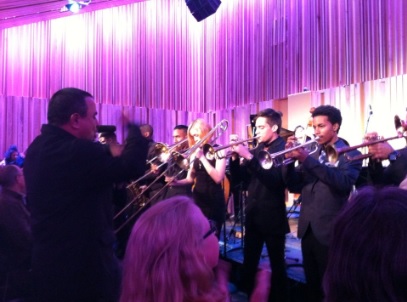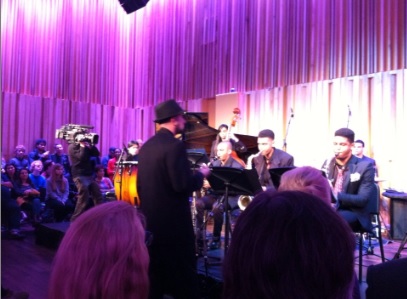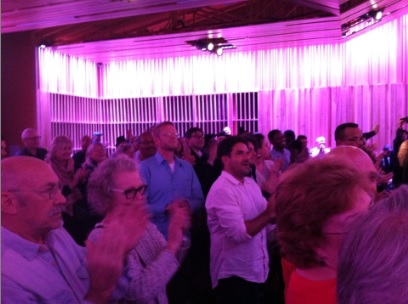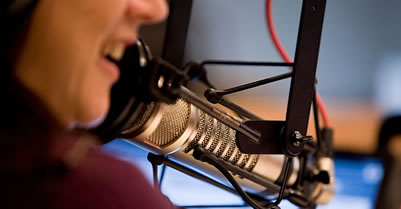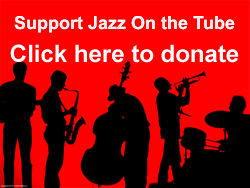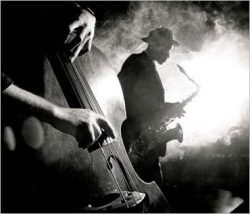Afro-Cuban culture, Blog, Cuban Jazz, Latin Jazz, The Cuba-US connection

Giovanni Russonello shines a light on two things we’ve been writing about a lot in recent years:
The sublime pleasures of Latin Jazz and the incredible new generation of players and composers who merit a lot more attention than they are currently getting.
This appeared in today’s (February 11, 2017) New York Times:
Latin Jazz is Booming. Look Beyond the Grammys to Find It.
By Giovanni Russonello
When the Grammy Awards eliminated the category of best Latin jazz album six years ago, an outcry arose quickly. Musicians and advocates argued that the move cut off a rare source of institutional recognition for a genre at the commercial fringes. And the academy listened. The next year the category returned.
In the years since, the importance of that recognition has become even clearer: Latin jazz is experiencing a kind of creative bloom, with musicians diversifying their work at an uncommon clip. It’s generating some of the most invigorating improvised music around.
So maybe it is a bit disappointing that the Grammy nominations this year don’t fully reflect those developments, focusing instead on older musicians. Every nominee up for best Latin jazz album this Sunday is over 60.
More: https://www.nytimes.com/2017/02/10/arts/music/grammys-latin-jazz.html?_r=0
– Ken McCarthy
Jazz on the Tube
P.S. Our unique programming is made possible by help from people like you. Learn how you can contribute to our efforts here: Support Jazz on the Tube
Thanks.

Blog, Cuba, Cuban Jazz, Latin Jazz, The Cuba-US connection, Video and audio
New Orleans and Havana have a long history together.
For a while (1762 to 1802) when Louisiana (“Luisiana” in Spanish) was a Spanish holding, New Orleans was administered by Havana and the Spanish left behind many beautiful buildings.
Much of the French Quarter was actually built by the Cubans after a catastrophic fire destroyed most of the old city in 1788.
U.S. troops about to enter the Spanish-American War, which included the liberation of Cuba from Spanish control, shipped out of New Orleans and returned there (which is why New Orleans was full of used brass instruments around the turn of the century.)
Also, several members of important community brass bands were part of the force that invaded and then occupied Havana after the war. You can be sure they brought back some Cuban feel from the experience.
Dave Bartholomew, the New Orleanian who put his formative stamp on rock ‘n roll in the late 1940s, says he got the riff from his iconic “Country Boy” (used later on thousands of rock tunes including Elvis Presley’s “Hound Dog”) from a Cuba Son record.
And on and on it goes.
The history continued in January of 2017 with a visit by high school jazz students from Havana to New Orleans, the first such visit in at least 60 years (possibly the first such visit ever.)
The kids worked with musicians at Preservation Hall and gave a performance which was received enthusiastically by the city’s discriminating jazz fans.
In the captions below, we note the names of the Cuban educators who train and manage the band, two of the great unsung heroes in the Horns to Havana organization: Enrique Toledo and Camilo Moreira.
 Orchestra Director Enrique Toledo
Orchestra Director Enrique Toledo
 Camilo Moreira conducts
Camilo Moreira conducts
 Standing ovation in New Orleans for the kids from Cuba
Standing ovation in New Orleans for the kids from CubaEnrique Toledo conducts the Conservatorio Amadeo Roldán Jazz Orchestra in Havana, January 2016.
– Ken McCarthy
Jazz on the Tube
P.S. Our unique programming is made possible by help from people like you. Learn how you can contribute to our efforts here: Support Jazz on the Tube
Thanks.
Afro-Cuban culture, Blog, Cuba, Cuban Jazz, Latin Jazz, The Cuba-US connection, Video and audio
It’s billed as “the largest celebration of Cuban culture in the U.S. since the 1950’s” – and it may well be true.
This year’s New Orleans Jazz Fest will include over 150 Cuban musicians, artists and craftsman, a large number of whom will be visiting the United States for the very first time.
Events will be at the Cultural Exchange Pavilion.
Performances on the Cuban Stage every day from 11:30 AM to 5:30 PM
Friday, April 28
The Pedrito Martinez Group
Septeto Nacional Ignacio Piñeiro of Cuba
Grupo Caury of Cuba
Saturday, April 29
Septeto Nacional Ignacio Piñeiro of Cuba
Grupo Caury of Cuba
Telmary y Habana Sana of Cuba
The Pedrito Martinez Group
Conga Los Hoyos of Cuba
Abdullah Ibrahim (Not Cuban but don’t miss him!)
Sunday, April 30
Septeto Nacional Ignacio Piñeiro of Cuba
Telmary y Habana Sana of Cuba
Conga Los Hoyos of Cuba
Grupo Caury of Cuba
Lakou Mizik (Haiti)
Gente de Zona
Thursday, May 4
The Pedrito Martinez Rumba Project featuring Roman Diaz
Changüí Guantánamo of Cuba
Conga Los Hoyos of Cuba
Friday, May 5
The Pedrito Martinez Rumba Project featuring Roman Diaz
Adonis y Osain del Monte of Cuba
Changüí Guantánamo of Cuba
Saturday, May 6
Los Van Van
The Pedrito Martinez Rumba Project featuring Roman Diaz
Adonis y Osain del Monte of Cuba
Changüí Guantánamo of Cuba
Septeto Santiaguero of Cuba
Conga Los Hoyos of Cuba
Sunday, May 7
Chucho Valdes Quintet,
Adonis y Osain del Monte of Cuba
Daymé Arocena of Cuba
Septeto Santiaguero of Cuba
Changüí Guantánamo of Cuba
– Ken McCarthy
Jazz on the Tube
P.S. Our unique programming is made possible by help from people like you. Learn how you can contribute to our efforts here: Support Jazz on the Tube
Thanks.
Afro-Cuban culture, Blog, Cuba, Cuban Jazz, Latin Jazz, Video and audio

One way to learn more about Cuban and Afro-Latin music is to take advantage of some of the excellent radio shows on the subject.
Here’s a short list of ones that you can stream via the Internet from anywhere on earth.
If you know of any other good programs that are streamable, please write us and we’ll add them to the list.
WWPV.org (Cuban)
Sundays Noon to 3 PM
‘Cuban Bridge” with Toni Basanta
An erudite and enjoyable three hours from one of the world’s most enthusiastic and informed experts on Cuba’s music past, present, and to come
WBAI.org (Pan Latin)
Tuesdays 10 AM to 12 PM
New York International with Al Angeloro
Saturdays 3 PM to 6 PM
New World Gallery with “Chico” Alvarez
Sundays 3 PM to 6 PM
Con Sabor Latino with Nando Albericci + Marysol Cerdeira
Note: Many of these programs are also archived
WKCR.org (Pan Latin)
Mondays 10 PM to 12 AM
Caribe Latino
Tuesdays 12 AM to 1 AM
Latin Jazz Hour
Wednesdays 10 PM to 11 PM
Nueva Cancion y Demas
Wednesdays 11 PM to 1 AM
Som do Brasil
KRTU (Pan Latin)
Every Sunday from 11:00 am to 2:00 pm (Central Time)
The Latin Jazz Brunch with Henry Brun Airs from: San Antonio, Texas and also streams live online and is archived. The program has been on the air for 15 years.
Salsa Warriors (Pan Latin)
Last but not least, there’s this 24/7 option. We especially recommend Que Viva La Music with Vicki Sola, Marysol Cerdeira and Andres Padua.
Afro-Latin music venues
For Afro-Latin music venues in New York City (the northern most outpost of the Caribbean), click here: Afro-Latin music venues in New York City
– Ken McCarthy
Jazz on the Tube
P.S. Our unique programming is made possible by help from people like you. Learn how you can contribute to our efforts here: Support Jazz on the Tube
Thanks.
Afro-Cuban culture, Blog, Cuba, Cuban Jazz, Latin Jazz, The Cuba-US connection
 Cuban percussion master Cándido de Guerra Camero (“Candido”)
Cuban percussion master Cándido de Guerra Camero (“Candido”)
with Charlie Parker and Dizzy Gillespie in New York City in 1950A surprising number of hard core jazz fans have never seen this picture and would not be able to explain its historical context or significance.
– Ken McCarthy
Jazz on the Tube
P.S. Our unique programming is made possible by help from people like you. Learn how you can contribute to our efforts here: Support Jazz on the Tube
Thanks.
Afro-Cuban culture, Blog, Cuba, Cuban Jazz, Latin Jazz, Video and audio
One of the highlights of my March 2016 trip to Cuba was visiting the small city of Güines, a major historical center of Cuba’s sugar industry, 50 kilometers southeast of Havana.
The city center has a beautiful town square and many handsome private homes and is the birthplace of not one but two Cuban music legends: Tata Güines and Arsenio Rodríguez.
By an accident of fate, the two were raised so closely together, if you have a good arm you could throw a rock from Tata Guines’s childhood home, (a one room former slave cell) to Arsenio’s childhood home, (a small house on the street just beyond the barracks compound.)
Along with Chano Pozo and Patato Valdés, Güines, who was born in 1930, is considered one Cuba’s greatest masters of the tumbadora, the conga drum.
Fortunately, there’s a lot of excellent video of his work.
First, Güines with a group of friends (“Los Amigos”): pianist (Frank Emilio), flautist, (Miguel O’Farril), bassist (Chachuito) and timablero (Guillermo Barreto).
Güines tells a bit of his life story which is followed by a solo
Güines with the legendary rumba group Yoruba Abdado and Changuito (filmed in 2002)
And now, for a lesson from the master.
Spanish and/or French will come in handy here. If not an attentive pair of eyes and ears will help.
Want more instruction?
Good!
Whether you play or are simply someone who loves and is fascinated by the music, this tutorial with Changuito (José Luis Quintana) and Giovanni Hidalgo will change your ears – for the better – forever.
Click here: Inside the Conga
– Ken McCarthy
Jazz on the Tube
P.S. Our unique programming is made possible by help from people like you. Learn how you can contribute to our efforts here: Support Jazz on the Tube
Thanks.



